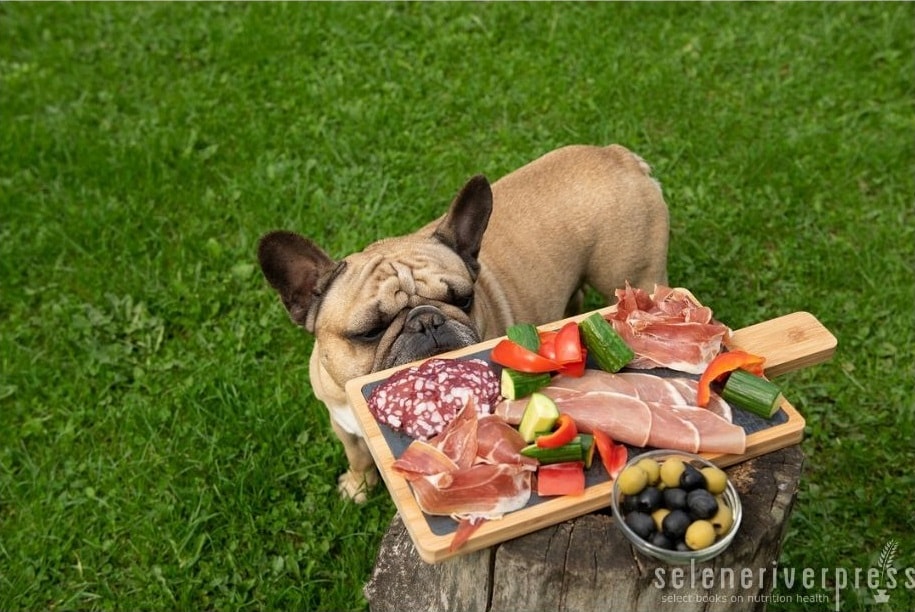I’m a firm believer in offering fresh foods to our pets, yet a number of things we humans eat can be harmful, toxic, or even deadly to our dogs and cats.
Unfortunately, the modern American diet is full of unhealthy, processed, and refined foods. And it only makes sense that what is unhealthy for us is just as unhealthy for our pets. Like humans, dogs and cats require specific vitamins and nutrients to maintain a healthy life—nutrients that cannot be found in pizza, french fries, and junk food.
Cats are obligate carnivores, meaning they eat mostly meat and very little carbohydrates, so grain-free foods are good options for felines. Dogs are true to the definition of an omnivore, meaning they consume foods that are both plant and animal in origin. They can get nutrition from vegetables, fruits, grains, and meats.
Whether it’s joint strength, better breath, or allergy immunity, canine health can benefit when certain human foods are introduced to their diet. However, this doesn’t mean all human foods. Some can wreak havoc on a dog’s body, causing severe health problems.
The Right Food
Years ago, we were taught that it was never okay to give our pets table scraps. Well, times have changed. There’s plenty of research out there on how important it is to feed dogs a variety of fresh, healthy foods. Let’s take a look at some of my favorites.
Carrots: Raw or frozen carrots can support canine dental health by gently scraping the teeth and preventing plaque buildup. To prevent choking, especially in small dogs, cut carrots into bite-size chunks before feeding them to your dog. Carrots are rich in vitamin A, which supports eye health, helps build a thriving immune system, and contributes to a healthy coat. It’s best to cook carrots to reap the full nutritional benefits, so I recommend lightly steaming them.
Eggs: Everything a chick needs to develop and thrive is contained in the egg. This includes protein-producing amino acids that help build muscle, strengthen hair, and enhance tissue repair. Eggs are also a valuable source of calcium, necessary for strong bones and teeth.
Apples: Most dogs love the sweet taste and crunchy bite of apples, which are a great source of vitamins A and C. I suggest coring any apples before you give them to your dog. Although a small amount of apple seeds isn’t likely to be a problem, eating too many can be an issue. That’s because apple seeds contain cyanide, which can build up over time and prevent the blood from carrying oxygen throughout the body.
Green beans: Plain green beans—served steamed or raw—are another safe option for dogs to eat. In fact, veterinarians recommend green beans as a healthy treat, as long as you chop them and serve them plain. Green beans contain fiber, vitamins K and C, and manganese. Vitamin K helps with blood clotting, which is very important in case your dog gets injured. Best of all, dogs seem to love them.
Pumpkin: Orange beauty that it is, pumpkin is a superfood that contains a high concentration of beta-carotene and potassium, the latter of which helps regulate blood pressure, improves muscle health, and assists in metabolism. Pumpkin also contains smaller amounts of a variety of healthy nutrients, including vitamin C, iron, phosphorus, magnesium, and folate, just to name a few. In addition to these benefits, plain, unsweetened, cooked pumpkin can help with both diarrhea and constipation. You can give your dog or cat puréed 100 percent pumpkin from a can or fresh, cooked pumpkin. (Be sure you don’t give your pet pumpkin pie filling, which has added sugar and spices.)
The Wrong Food
Now let’s take a look at foods that we should never give to our pets.
Chocolate: This one is a big no no! Chocolate contains toxic substances called methylxanthines, stimulants that can stop a dog’s metabolic process. Even just a little bit of chocolate (especially dark chocolate) can cause diarrhea and vomiting. A large amount can cause seizures, irregular heart function, and even death.
Onions, chives, and garlic: Onions, leeks, chives, and garlic are all part of the allium family, but they’re five times more toxic to dogs than the rest of the allium plants. Garlic can create anemia in dogs, which in turn causes side effects such as pale gums, elevated heart rate, weakness, and collapse. Poisoning from garlic and onions may have delayed symptoms. Therefore, if you think your dog may have eaten some, monitor them for a few days, not just right after ingesting.
Grapes and raisins: Grapes (whether peeled or seedless) and raisins are both known to be highly toxic to dogs and could potentially lead to sudden kidney failure. Research has yet to pinpoint exactly which substance in the fruit causes this reaction. It’s better to be safe than sorry, so avoid them.
Avocado: Avocados contain persin, which is fine for people who aren’t allergic to it. However, too much might cause vomiting or diarrhea in dogs. Persin is in the leaves, seed, bark, and fruit of the avocado. Additionally, the avocado seed can become stuck in the intestines or stomach, where obstruction could be fatal.
Coffee, tea, and alcohol: Pets are more sensitive to the effects of caffeine than people. While one or two cups of coffee, tea, or soda don’t contain enough caffeine to cause poisoning in most cases, the ingestion of moderate amounts of coffee grounds, tea bags, or one or two diet pills can easily cause death in small dogs or cats. It is never acceptable to give your dog any form of alcohol. Canine livers aren’t equipped to break down alcohol, so dogs can experience alcohol poisoning just as humans can, only more quickly
This is not a complete list of all the foods that are safe or unsafe for your dog. For more information on various human foods that are safe as well as those to avoid, review this nutrition information from the America Kennel Club.
If you think your pet has ingested a potentially poisonous substance, contact the ASPCA Animal Poison Control Center immediately. They are open 24 hours a day, 365 days a year. Their toll-free number is (888) 426-4435.
Whether you are feeding your pet fresh foods or not, consider supplementation. I personally like to give my pets Standard Process whole food supplements to fill in the nutritional gaps in their diets. These safe and effective supplements are developed specifically for dogs and cats, and they’re the closest thing you can get to fresh, raw food. In fact, the ingredients in these supplements are things our animals would naturally eat in the wild. Talk to your veterinarian about which Standard Process whole food supplement is best for your pet. A wise veterinarian once told me that every breathing pet should be on Standard Process Canine Whole Body Support or Feline Whole Body Support.
Image from iStock/Aleksey Zhidkov (French Bulldog), FamVeld (child and the cat), humonia (little white dog).



